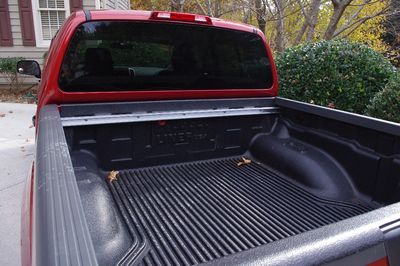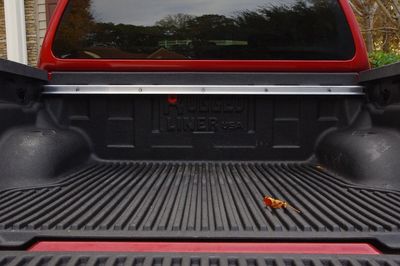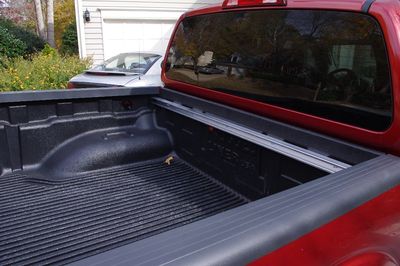Difference between revisions of "2012 Nissan Frontier: Strut Channel Install"
| (15 intermediate revisions by the same user not shown) | |||
| Line 1: | Line 1: | ||
| − | This article details the design & installation of a 5' section of [https://en.wikipedia.org/wiki/Strut_channel Strut Channel] into the bed of my 2012 Nissan Frontier Crew Cab SV 4x4. This is a functional (although different) stand-in for the [http://www.nissanusa.com/innovations/utili-track.article.html Utili-Track™] that comes as an option on some Nissan Frontiers. Frontiers that did not come standard with the Utili-Track™ cannot have it easily installed because the bed-frame is different. Inspiration for this project came from [http://www.clubfrontier.org/forums/f23/diy-writeup-utilitrack-unistrut-34948/ Tyson Cook's DIY Writeup - Utilitrack with Unistrut] over at the [http://www.clubfrontier.org/ Club Frontier Forums]. I chose to install this Strut Channel because it gives a good base (that does not permanently modify the vehicle) to mount a Ham Radio Antenna | + | This article details the design & installation of a 5' section of [https://en.wikipedia.org/wiki/Strut_channel Strut Channel] (also known by trade names such as G-STRUT, Flexstrut, Kindorf, Unistrut, SuperStrut, Strut, Metstrut, & JIKAstrut) into the bed of my 2012 Nissan Frontier Crew Cab SV 4x4. This is a functional (although different) stand-in for the [http://www.nissanusa.com/innovations/utili-track.article.html Utili-Track™] that comes as an option on some Nissan Frontiers. Frontiers that did not come standard with the Utili-Track™ cannot have it easily installed because the bed-frame is different. Inspiration for this project came from [http://www.clubfrontier.org/forums/f23/diy-writeup-utilitrack-unistrut-34948/ Tyson Cook's DIY Writeup - Utilitrack with Unistrut] over at the [http://www.clubfrontier.org/ Club Frontier Forums]. I chose to install this Strut Channel because it gives a good base (that does not permanently modify the vehicle) to mount a Ham Radio Antenna. I later installed a set of front fork mounts for my mountain bikes. After a parts order from [http://www.mcmaster.com/ McMaster-Carr] and 5 trips to various Home Depots & Lowe's I finally had what I needed. I'll try to streamline the process for anyone wanting to follow my example. |
| + | |||
==Assumptions== | ==Assumptions== | ||
| Line 5: | Line 6: | ||
#You have a drop-in bed-liner | #You have a drop-in bed-liner | ||
#You don't want to make any permenant modifications to the vehicle | #You don't want to make any permenant modifications to the vehicle | ||
| + | |||
==Grocery List== | ==Grocery List== | ||
| − | + | *1 section of [http://www.mcmaster.com/#strut-channel-systems/ Strut Channel] | |
| − | + | **1 5/8" depth (& width) | |
| − | + | **5' length (fits perfectly) | |
| − | + | **Solid (slotted will cause the section to be off-center but requires no drilling) | |
| − | + | **Aluminium (we don't want it to rust) | |
| − | #5 | + | *5 M8x1.25 45mm Hex Bolts |
| + | *5 [http://www.lowes.com/pd_137132-37672-880417_4294710912__?productId=3012477&Ns=p_product_avg_rating|1 3/8" x 1/2" x 1" Steel Spacers] (only Lowes had these, not Home Depot) | ||
| + | *5 M8 split washers (lock washers) | ||
| + | *10 M8 flat washers | ||
| + | *[http://www.gorillatough.com/index.php?page=anti-clog Gorilla Glue] | ||
| + | *7/8" Spade Bit | ||
| + | *23/64" Drill Bit | ||
| + | *Small Drill Bit (smallest you've got: for pilot holes) | ||
| + | *Metric Ruler with at least 30mm (preferably 60mm) of marked length | ||
| + | *13mm Socket + Ratchet with Extension | ||
| + | *[http://www.homedepot.com/h_d1/N-5yc1v/R-100356502/h_d2/ProductDisplay?catalogId=10053&langId=-1&keyword=square&storeId=10051#.UJZ4n8VuSQE Combination Square] | ||
| + | *[http://www.homedepot.com/h_d1/N-5yc1v/R-100000053/h_d2/ProductDisplay?catalogId=10053&langId=-1&keyword=Utility+Knife&storeId=10051#.UJZ4xMVuSQE Utility Knife] | ||
| + | *[http://www.homedepot.com/buy/brasscraft-deburring-tool-t090.html#.UJZttcVuSQE Deburring Tool] | ||
| + | *Pencil | ||
| + | *(optional) [http://www.homedepot.com/Plumbing-Plumbing-Tools-Brushes/h_d1/N-5yc1vZbqnb/R-100342840/h_d2/ProductDisplay?catalogId=10053&langId=-1&storeId=10051#.UJZunsVuSQE Fitting Brush] | ||
| + | *(optional) [http://www.lowes.com/pd_78742-46069-PCB660DP_0__?productId=3162489 Drill Press]. If you don't have access to a Drill Press a Hand Drill will work. | ||
| + | |||
| + | |||
| + | ==Basic Information== | ||
| + | *The wall of the bed of your Frontier should have 5 evenly spaced bolts in it, a few inches from the top lip. | ||
| + | *These holes are spaced 30cm apart from each other and are centered in the bed (left to right) | ||
| + | *These holes are size M8x1.25 (a metric bolt meaning an 8mm diameter with 1.25mm thread spacing. Don't get M8x1.0 bolts by mistake) | ||
| + | |||
| + | |||
| + | ==Directions== | ||
| + | <span style="color:#55E439">Click on any photograph for a larger view.</span> | ||
| + | |||
| + | ===Prepping The Truck=== | ||
| + | #Pull up the front lip of the bed liner. I simply had to pull up & out on the middle of the top lip to get it to come free. I probably pulled it off and put it back on 20 times during the install to check fit.<br />[[File:Strut_Channel_Liner_Lip.jpg|400px]] | ||
| + | #<span style="color:#55E439">'''This is probably the trickest part of the whole install'''</span>: You need to drill pilot holes in your bed-liner that line up with the factory bolts on the Frontier. I basically had to eyeball my first hole. From there I measured as best I could (although this was made difficult but the uneven surface of the bed-liner) I haven't come up with a better solution but this worked for me. | ||
| + | ##With the bed-liner pulled off (and the factory bolts in place) I eyeballed the first hole and used the smallest drill bit I had to drill a hole through the bed-liner. | ||
| + | ##I then reinstalled the bed-liner, stuck my drill bit back in the hole, and ran it against the factory bolt for a second to, intentionally, leave a scratch mark. After seeing that I was off center a bit I tried again. The 3 photos below show the results of this technique. The blue circle highlights my 1st attempt. The green circle highlights my 2nd attempt. The photo of the bedliner shows the 2 holes I drilled for the 1st location.<br />[[File:Strut_Channel_Bolt1.jpg|400px]][[File:Strut_Channel_Bolt2.jpg|400px]][[File:Strut_Channel_Bolt3.jpg|400px]]<br />[[File:Strut Channel_2_Pilot_Holes.jpg|400px]] | ||
| + | ##For the rest of the pilot holes I attempted to measure the distance of the "good" pilot hole from the top lip of the bed-liner using a ruler and then used this value + the known 30cm spacing of the bolt holes to measure out the rest of the locations which I marked with a pen before drilling. This was, surprisingly, successful and all the rest of my pilot holes lined up well. The photo is an example of a marked & drilled pilot hole. You can see how I marked both the up-down & left-right separately. I repeated the "scratch the bolt head" technique for all the rest of my pilot holes to prove to myself that they were in the correct locations.<br />[[File:Strut Channel_Pilot_Hole.jpg|400px]] | ||
| + | ##Once you've done all 5 pilot holes the hard part is over! Congratulations! | ||
| + | #Now you can remove all 5 factory bolts from the truck.<br />[[File:Strut_Channel_No_Bolt.jpg|400px]] | ||
| + | #The next step is to drill out the holes in the bed-liner to the desired size. | ||
| + | ##I chose a 7/8" spade bit to do this.<br />[[File:Strut_Channel_Spade_Bit.jpg|400px]] | ||
| + | ##While pulling out on the bed-liner (to ensure you don't overshoot into the painted bed of the truck) use your Spade Bit to drill out each pilot hole. Then use your Utility Knife to remove the excess plastic. Finish up with the Deburring Tool, followed by the Fitting Brush, to clean up the hole.<br />[[File:Strut_Channel_Liner_Hole_1.jpg|400px]][[File:Strut_Channel_Liner_Hole_2.jpg|400px]][[File:Strut_Channel_Liner_Hole_3.jpg|400px]] | ||
| + | |||
| + | ##Replace the bedliner for the last time! Congratulations! The Truck is now Prepped. If you did a good job, the holes look like they belong and that they came from the factory that way (just like the holes for the 4 corner cleats)<br />[[File:Strut_Channel_Liner_Holes_4.jpg|400px]] | ||
| + | |||
| + | ===Prepping The Strut Channel=== | ||
| + | #Drilling the Holes | ||
| + | ##Flip the Strut Channel face down so that the open part is against your bench and you are looking at the back. | ||
| + | ##Measure the exact width of the Strut Channel, divide that in half. Mark the center line of the Strut Channel in several locations. Using a pencil and ruler, draw the (lengthwise) center line of the Strut Channel. | ||
| + | ##Measure the exact length of you section of Strut Channel (it might not be exactly 5'), divide that number in half, and mark off the center of the piece. | ||
| + | ##At this point you should have a cross where the center bolt hole goes. Using your Metric Ruler measure out 30cm & 60cm in each direction and mark those points. Double check your measurements after doing so. | ||
| + | ##Using a small drill bit (and, ideally a Drill Press) drill pilot holes at each cross. | ||
| + | ##Then go back and, using a 23/64" Drill Bit drill out each pilot hole. The photos below shows the finished product. You can see the pencil marks as well.<br />[[File:Strut_Channel_Bolt_Holes_1.jpg|400px]][[File:Strut_Channel_Bolt_Holes_2.jpg|400px]] | ||
| + | #Mounting the Spacers & Flat Washers. | ||
| + | ##Place a Spacer on top of a, freshly drilled, hole and put a drop of glue on each side. You don't need much. This isn't meant to be structural, just to hold the spacer in place. We will remove the glue later. Make sure the Spacer is properly centered. Repeat for all 5 holes. <span style="color:#55E439">Let this dry for several hours before moving on to the next step.</span><br />[[File:Strut_Channel_Spacer_1.jpg|400px]][[File:Strut_Channel_Spacer_2.jpg|400px]] | ||
| + | ##Once the glue has dried we're going to tack a Washer on top of each spacer (I wanted a Washer against the truck to ensure that torquing on the Spacer wouldn't damage the truck body.) Because of the way Washers are made (stamped out) they have a smooth side and a sharp side. Put the glue on the sharp side so the smooth side contacts the truck. Place a single, teeny-tiny, drop of glue on a washer and place it on top of the spacer (we use a tiny amount of glue because we want the washer to be able to break free in case everything doesn't line up quite perfectly.) Make sure it is centered. Repeat for all 5 holes. <span style="color:#55E439">Let this dry for several hours before moving on to the next step.<br />[[File:Strut_Channel_Spacer_3.jpg|400px]][[File:Strut_Channel_Spacer_4.jpg|400px]][[File:Strut_Channel_Spacer_5.jpg|400px]] | ||
| + | #Congratulations! The Strut Channel is now Prepped! Time to install! | ||
| + | |||
| + | |||
| + | ===Putting It All Together=== | ||
| + | <span style="color:#55E439">During this entire procedure be very gentle and careful not to knock your Washers off the ends of your Spacers.</span> | ||
| + | #Stage your Bolts by placing a Split Washer and then a Flat Washer onto each of your 5 M8x1.25 bolts. | ||
| + | #Take one Bolt Assembly and place it through a Hole/Spacer/Washer in your Strut Channel Assembly. Slide the entire thing into place in the bed of the truck (you will have to put each Spacer into the hole you drilled in the bed liner. | ||
| + | #Using your fingers screw the bolt into place but leave it very loose. Repeat this procedure for all 5 bolts. | ||
| + | #Go back and tighten everything up with your 13mm Socket/Wrench/Extension. I like to do this in 2 pass. The 1st being sorta tight. The 2nd being really tight. | ||
| + | #Now go back with your Utility Knife and cut/pry the Gorilla Glue blobs off where they are showing (this shouldn't be too difficult).<br />[[File:Strut_Channel_No_Glue_1.jpg|400px]][[File:Strut_Channel_No_Glue_2.jpg|400px]] | ||
| + | #Congratulations! You're done! You now have a really useful, really good looking, install of Strut Channel in the bed of your Gen2 Nissan Frontier!<br />[[File:Strut_Channel_Complete_1.jpg|400px]][[File:Strut_Channel_Complete_2.jpg|400px]][[File:Strut_Channel_Complete_3.jpg|400px]] | ||
| + | |||
| + | [[Category:Nissan Frontier]] | ||
Latest revision as of 21:25, 23 November 2018
This article details the design & installation of a 5' section of Strut Channel (also known by trade names such as G-STRUT, Flexstrut, Kindorf, Unistrut, SuperStrut, Strut, Metstrut, & JIKAstrut) into the bed of my 2012 Nissan Frontier Crew Cab SV 4x4. This is a functional (although different) stand-in for the Utili-Track™ that comes as an option on some Nissan Frontiers. Frontiers that did not come standard with the Utili-Track™ cannot have it easily installed because the bed-frame is different. Inspiration for this project came from Tyson Cook's DIY Writeup - Utilitrack with Unistrut over at the Club Frontier Forums. I chose to install this Strut Channel because it gives a good base (that does not permanently modify the vehicle) to mount a Ham Radio Antenna. I later installed a set of front fork mounts for my mountain bikes. After a parts order from McMaster-Carr and 5 trips to various Home Depots & Lowe's I finally had what I needed. I'll try to streamline the process for anyone wanting to follow my example.
Contents
Assumptions
- You want a really clean looking install and are willing to put in a bit of extra work
- You have a drop-in bed-liner
- You don't want to make any permenant modifications to the vehicle
Grocery List
- 1 section of Strut Channel
- 1 5/8" depth (& width)
- 5' length (fits perfectly)
- Solid (slotted will cause the section to be off-center but requires no drilling)
- Aluminium (we don't want it to rust)
- 5 M8x1.25 45mm Hex Bolts
- 5 3/8" x 1/2" x 1" Steel Spacers (only Lowes had these, not Home Depot)
- 5 M8 split washers (lock washers)
- 10 M8 flat washers
- Gorilla Glue
- 7/8" Spade Bit
- 23/64" Drill Bit
- Small Drill Bit (smallest you've got: for pilot holes)
- Metric Ruler with at least 30mm (preferably 60mm) of marked length
- 13mm Socket + Ratchet with Extension
- Combination Square
- Utility Knife
- Deburring Tool
- Pencil
- (optional) Fitting Brush
- (optional) Drill Press. If you don't have access to a Drill Press a Hand Drill will work.
Basic Information
- The wall of the bed of your Frontier should have 5 evenly spaced bolts in it, a few inches from the top lip.
- These holes are spaced 30cm apart from each other and are centered in the bed (left to right)
- These holes are size M8x1.25 (a metric bolt meaning an 8mm diameter with 1.25mm thread spacing. Don't get M8x1.0 bolts by mistake)
Directions
Click on any photograph for a larger view.
Prepping The Truck
- Pull up the front lip of the bed liner. I simply had to pull up & out on the middle of the top lip to get it to come free. I probably pulled it off and put it back on 20 times during the install to check fit.
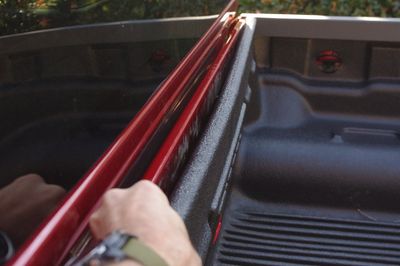
- This is probably the trickest part of the whole install: You need to drill pilot holes in your bed-liner that line up with the factory bolts on the Frontier. I basically had to eyeball my first hole. From there I measured as best I could (although this was made difficult but the uneven surface of the bed-liner) I haven't come up with a better solution but this worked for me.
- With the bed-liner pulled off (and the factory bolts in place) I eyeballed the first hole and used the smallest drill bit I had to drill a hole through the bed-liner.
- I then reinstalled the bed-liner, stuck my drill bit back in the hole, and ran it against the factory bolt for a second to, intentionally, leave a scratch mark. After seeing that I was off center a bit I tried again. The 3 photos below show the results of this technique. The blue circle highlights my 1st attempt. The green circle highlights my 2nd attempt. The photo of the bedliner shows the 2 holes I drilled for the 1st location.
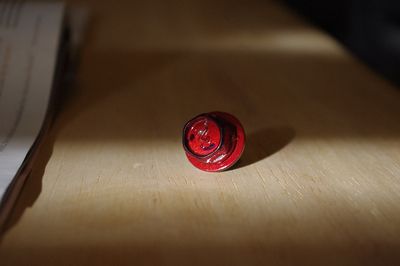
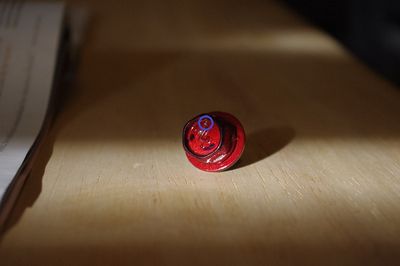
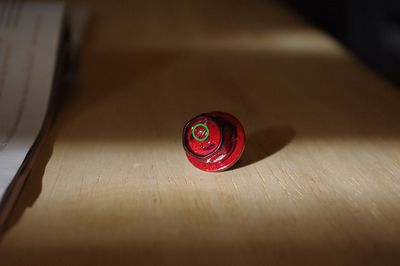

- For the rest of the pilot holes I attempted to measure the distance of the "good" pilot hole from the top lip of the bed-liner using a ruler and then used this value + the known 30cm spacing of the bolt holes to measure out the rest of the locations which I marked with a pen before drilling. This was, surprisingly, successful and all the rest of my pilot holes lined up well. The photo is an example of a marked & drilled pilot hole. You can see how I marked both the up-down & left-right separately. I repeated the "scratch the bolt head" technique for all the rest of my pilot holes to prove to myself that they were in the correct locations.
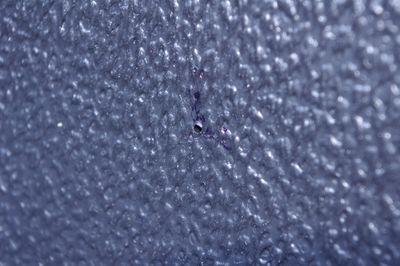
- Once you've done all 5 pilot holes the hard part is over! Congratulations!
- Now you can remove all 5 factory bolts from the truck.
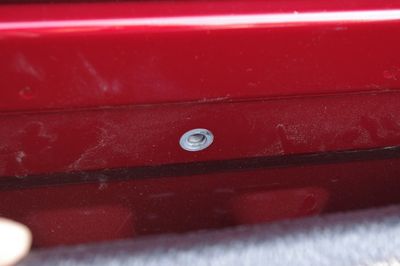
- The next step is to drill out the holes in the bed-liner to the desired size.
- I chose a 7/8" spade bit to do this.
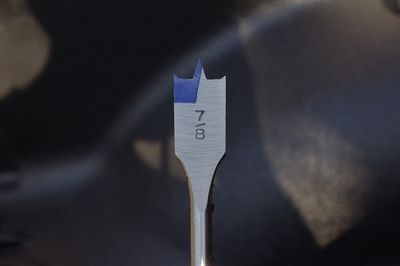
- While pulling out on the bed-liner (to ensure you don't overshoot into the painted bed of the truck) use your Spade Bit to drill out each pilot hole. Then use your Utility Knife to remove the excess plastic. Finish up with the Deburring Tool, followed by the Fitting Brush, to clean up the hole.



- I chose a 7/8" spade bit to do this.
Prepping The Strut Channel
- Drilling the Holes
- Flip the Strut Channel face down so that the open part is against your bench and you are looking at the back.
- Measure the exact width of the Strut Channel, divide that in half. Mark the center line of the Strut Channel in several locations. Using a pencil and ruler, draw the (lengthwise) center line of the Strut Channel.
- Measure the exact length of you section of Strut Channel (it might not be exactly 5'), divide that number in half, and mark off the center of the piece.
- At this point you should have a cross where the center bolt hole goes. Using your Metric Ruler measure out 30cm & 60cm in each direction and mark those points. Double check your measurements after doing so.
- Using a small drill bit (and, ideally a Drill Press) drill pilot holes at each cross.
- Then go back and, using a 23/64" Drill Bit drill out each pilot hole. The photos below shows the finished product. You can see the pencil marks as well.


- Mounting the Spacers & Flat Washers.
- Place a Spacer on top of a, freshly drilled, hole and put a drop of glue on each side. You don't need much. This isn't meant to be structural, just to hold the spacer in place. We will remove the glue later. Make sure the Spacer is properly centered. Repeat for all 5 holes. Let this dry for several hours before moving on to the next step.
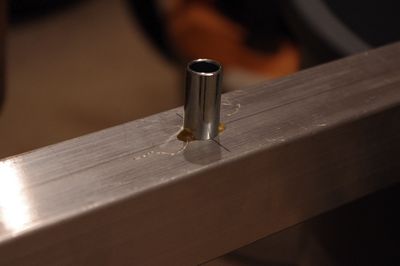
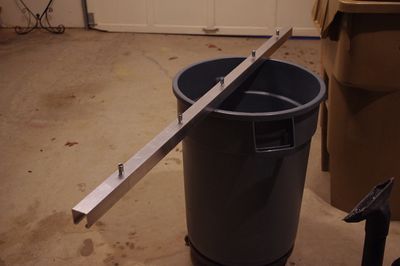
- Once the glue has dried we're going to tack a Washer on top of each spacer (I wanted a Washer against the truck to ensure that torquing on the Spacer wouldn't damage the truck body.) Because of the way Washers are made (stamped out) they have a smooth side and a sharp side. Put the glue on the sharp side so the smooth side contacts the truck. Place a single, teeny-tiny, drop of glue on a washer and place it on top of the spacer (we use a tiny amount of glue because we want the washer to be able to break free in case everything doesn't line up quite perfectly.) Make sure it is centered. Repeat for all 5 holes. Let this dry for several hours before moving on to the next step.
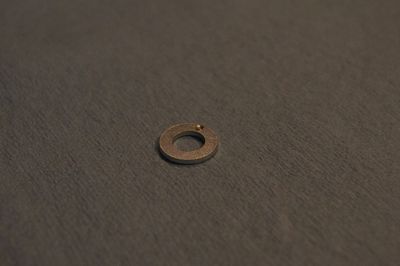
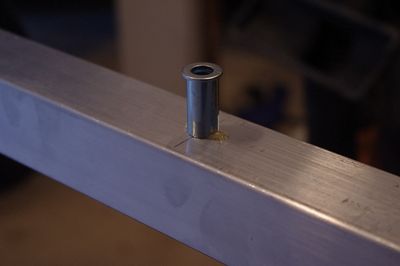
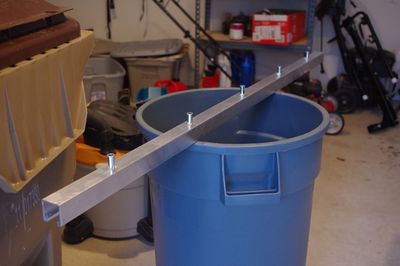
- Place a Spacer on top of a, freshly drilled, hole and put a drop of glue on each side. You don't need much. This isn't meant to be structural, just to hold the spacer in place. We will remove the glue later. Make sure the Spacer is properly centered. Repeat for all 5 holes. Let this dry for several hours before moving on to the next step.
- Congratulations! The Strut Channel is now Prepped! Time to install!
Putting It All Together
During this entire procedure be very gentle and careful not to knock your Washers off the ends of your Spacers.
- Stage your Bolts by placing a Split Washer and then a Flat Washer onto each of your 5 M8x1.25 bolts.
- Take one Bolt Assembly and place it through a Hole/Spacer/Washer in your Strut Channel Assembly. Slide the entire thing into place in the bed of the truck (you will have to put each Spacer into the hole you drilled in the bed liner.
- Using your fingers screw the bolt into place but leave it very loose. Repeat this procedure for all 5 bolts.
- Go back and tighten everything up with your 13mm Socket/Wrench/Extension. I like to do this in 2 pass. The 1st being sorta tight. The 2nd being really tight.
- Now go back with your Utility Knife and cut/pry the Gorilla Glue blobs off where they are showing (this shouldn't be too difficult).


- Congratulations! You're done! You now have a really useful, really good looking, install of Strut Channel in the bed of your Gen2 Nissan Frontier!
